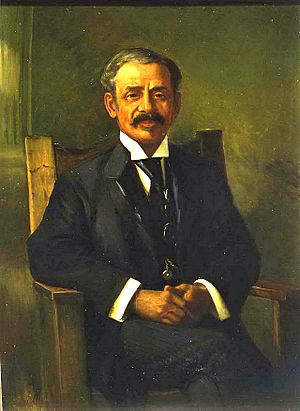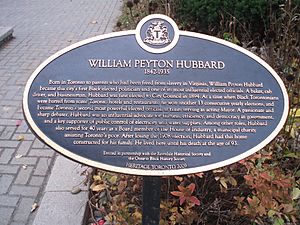William Peyton Hubbard facts for kids
Quick facts for kids
William Peyton Hubbard
|
|
|---|---|

Portrait of William Peyton Hubbard
|
|
| Alderman for Ward 4 | |
| In office 1894 — 1898, 1900 – 1903 |
|
| Vice-chairman of the Toronto Board of Control | |
| In office January 1, 1906 – December 31, 1906 |
|
| Toronto Board of Control | |
| In office 1898, 1901, 1904 – 1908 |
|
| Alderman for Ward 1 | |
| In office January 1, 1913 – December 31, 1913 |
|
| Personal details | |
| Born | January 27, 1842 Toronto, Upper Canada |
| Died | (aged 93) Toronto, Ontario, Canada |
| Spouse | Julia Luckett |
| Education | Toronto Normal School |
| Occupation | politician, baker, chauffeur |
William Peyton Hubbard (born January 27, 1842 – died April 30, 1935) was an important Toronto politician. He served as an alderman from 1894 to 1914. People called him "Cicero" because he was a great speaker. He was one of the first Black Canadian politicians elected in Canada.
Contents
Early Life and Family
William Peyton Hubbard was born in a small cabin in Toronto in 1842. His parents were formerly enslaved people from Virginia. They had escaped to Canada in 1840 using the Underground Railroad. This was a secret network that helped enslaved people find freedom.
William grew up in the Anglican faith. He learned to be a baker at the Toronto Normal School. He even invented a special oven called the Hubbard Portable, which was very successful.
Later, he married Julia Luckett. After working as a baker for 16 years, he joined his uncle's horse-drawn taxi business. A famous story says he once saved newspaper owner George Brown from drowning. Brown then hired Hubbard as his driver. This led to a strong friendship. Brown encouraged Hubbard to get involved in politics. William also had a lifelong friend named Anderson Ruffin Abbott, who was Canada's first Black doctor.
Getting Involved in City Politics
Hubbard first tried to become a politician in 1893 when he was 51. He ran for a spot on Toronto's City Council in Ward 4. He lost by only seven votes, but he didn't give up!
In 1894, he ran again in Ward 4 and won. This area was known for its beautiful homes. He was elected to the city council 15 times during his career.
Fighting for Public Services
William Peyton Hubbard was known as a reformer. He was very good at speaking, which earned him the nickname "Old Cicero". He believed in public service and worked hard for the people of Toronto.
He became famous for fighting for public ownership of Toronto's water and electricity. He wanted these services to be owned by the city, not by private companies. This would make them more affordable for everyone.
In 1898, Hubbard was chosen to be on the Toronto Board of Control. This was a very powerful group that helped run the city. He pushed for this board to be elected directly by the people. In 1904, he won an election to the board, becoming the first and only person of colour to win a city-wide election in Toronto. In 1906, he even served as acting mayor when the mayor was away.
Standing Up Against Unfairness
Hubbard also fought against different types of unfairness. In 1896, he defended the Chinese community in Toronto. They were facing unfair taxes on their hand laundries. He also asked the City Council to stop attacks on the Jewish religion by street preachers.
He worked with Sir Adam Beck to create a publicly owned electricity system for the province. This led to the creation of the Toronto Hydro-Electric System. Some business people wanted a private system, and this disagreement led to his election loss in 1908. It was his first loss in 24 years!
In 1908, he was made a justice of the peace for York County. This meant he could help with legal matters. He returned to the city council in 1913, representing a different area called Ward 1. He retired after one year because his wife was not well.
For 40 years, Hubbard also served on the board of the Toronto House of Industry. This organization helped people who were poor.
Later Years and Legacy
William Peyton Hubbard moved to the Riverdale area of Toronto. He built a home there and lived until he passed away from a stroke at 93 years old. People called him the "Grand Old Man" because he was so respected and lived a long life. Flags at Toronto City Hall and other public buildings were lowered to honour him. He is buried in the Toronto Necropolis.
His son, Frederick Langdon Hubbard, also became an important figure. He was the chairman of the Toronto Transportation Commission from 1929 to 1930.
Honours and Recognition
William Peyton Hubbard is remembered in many ways:
- His picture hangs in the office of the Mayor of Toronto.
- The City of Toronto created the William Peyton Hubbard Award For Race Relations in 1989. It is given out every year to people who work to improve relationships between different groups.
- The William Peyton Hubbard Memorial Award is a scholarship started in 2000. It helps Black students who want to study in fields related to the power industry.
- A historical plaque is placed in front of his old home at 660 Broadview Avenue. The building is now called Hubbard House.
- Hubbard Park, located at 562 Gerrard Street, was opened in 2016. Many of Hubbard's family members were there for the ceremony.
William Hubbard in Pop Culture
William Peyton Hubbard has also been shown in TV shows:
- He was played by actor Rothaford Gray in the Canadian mystery series Murdoch Mysteries. In one episode, he helps an innocent Black man who was unfairly targeted by the police.
- He was also played by actor Neville Edwards in the Canadian mystery series Frankie Drake Mysteries.
Biography
A book about William Peyton Hubbard's life, called Against All Odds, was published in 1986. It was written by his great-grandson, Stephen L. Hubbard.
Images for kids
 | Emma Amos |
 | Edward Mitchell Bannister |
 | Larry D. Alexander |
 | Ernie Barnes |




